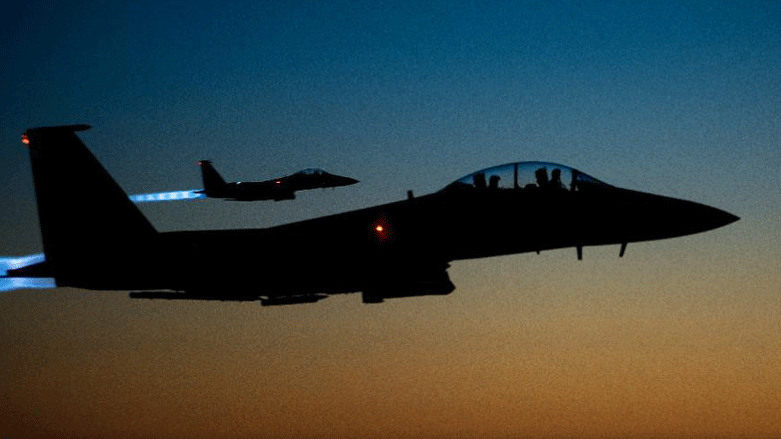US strikes Iraqi militias in Syria, retaliating for rocket attacks

WASHINGTON DC, United States (Kurdistan 24) – Early on Friday morning, around 2 a.m. local time, the US bombed Iraqi militias, backed by Iran, and based in eastern Syria near the Iraqi border.
The US strikes were in retaliation for a series of rocket attacks on US and Coalition targets, beginning with the Feb. 15 assault on Erbil International Airport that killed a contractor and a civilian man and wounded eight other people, as well as a US soldier.
The strikes were also intended to deter further attacks, as the US suggested, when the military action was announced late on Thursday in Washington DC, in a statement released by Pentagon Press Secretary John Kirby.
“US military forces earlier this evening conducted airstrikes against infrastructure utilized by Iranian-backed militant groups in eastern Syria,” Kirby said.
“These strikes were authorized in response to recent attacks against American and Coalition personnel in Iraq,” he stated, before adding the significant phrase, “and to ongoing threats to those personnel.”
More than any other official in Washington, Rep. Michael McCaul, Lead Republican on the House Foreign Affairs Committee, has called for such action. On Wednesday, in a statement to Kurdistan 24, the Texas Congressman warned of the danger of “more attacks with more possibilities of casualties,” if the US did not quickly determine who had been behind the attacks and respond accordingly.
READ MORE: Rep. McCaul calls for quick, decisive action to rocket attacks in Iraq
As Kirby explained on Thursday, the US strikes “destroyed multiple facilities located at a border control point used by a number of Iranian-backed militant groups,” including Kataib Hizbollah (Hizbollah Battalions) and Kataib Sayyid al-Shuhada (Battalions of the Master of the Martyrs).
In the strike, US warplanes dropped seven 500-pound bombs on seven targets, including a crossing at the border which the militias used to transfer weapons between Iraq and Syria.
The UK-based Syrian Observatory for Human Rights reported that at least 17 fighters were killed, and three truckloads of weapons were destroyed.
“We’re confident that that target was being used by the same Shia militia that conducted the strikes,” Secretary of Defense Lloyd Austin told reporters flying with him from California back to Washington on Thursday evening.
“We allowed and encouraged the Iraqis to investigate and develop intelligence. And that was very helpful to us in finding the target,” Austin said.
It is highly likely that the US strike took its targets, as well as their Iranian backers, by surprise. As recently as Wednesday, White House Press Secretary Jen Psaki had said about the series of rocket attacks on US and Coalition targets, “We have not made a final attribution.”
At the Pentagon, Kirby spoke similarly on Wednesday, saying, “We’re not able to give you a certain attribution as to who was behind these attacks.”
Psaki also stressed on Wednesday that, “What we will not do” is “lash out and risk an escalation that plays into the hands of Iran by further destabilizing Iraq.” By hitting targets in Syria, the Biden administration, presumably, hoped to lessen Iranian pressure on Iraq.
Psaki also noted on Wednesday that US President Joe Biden and Iraqi Prime Minister Mustafa al-Kadhimi had spoken the previous night and the rocket attacks had been “an extensive part” of their discussion.
Earlier on Wednesday, the US ambassador to Iraq, Matthew H. Tueller, met with Masrour Barzani, the prime minister of the Kurdistan Regional Government (KRG), which conducted its own investigation into the rocket attack on Erbil.
Shortly before the US strikes, Barzani announced that the preliminary investigation into the rocket attacks on Erbil had been completed, but he did not provide any further detail.
READ MORE: Kurdistan Region: Preliminary investigation into Erbil rocket attack complete
In his statement on Thursday, Kirby described the US strikes as a “proportionate military response” which was “conducted together with diplomatic measures, including consultation with Coalition partners.”
The strikes send “an unambiguous message,” Kirby affirmed. “President Biden will act to protect American and Coalition personnel,” while “we have acted in a deliberate manner that aims to de-escalate the overall situation in both eastern Syria and Iraq.”
Editing by Joanne Stocker-Kelly
